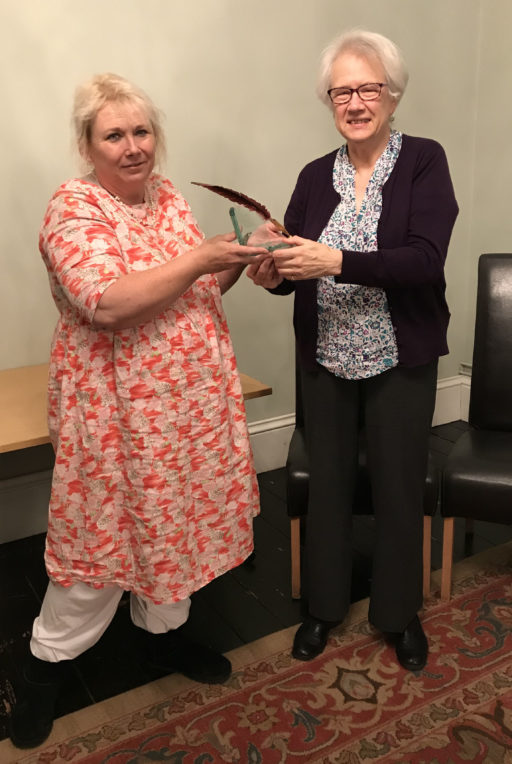
Maggie welcomed Sue Hardy-Dawson and invited her to give her adjudication of the 2019 Poetry Competition. Sue began by bringing members up to date on her own work, about which she had spoken on previous visits. She went on to read five poems from her new collection ‘If I were Other than Myself’ which was due to be published on 27th February 2020. These were ‘Legends of Bears’, ‘Casting Stones’, ‘Dolphin Dreaming’, ‘Found Poem’ and ‘Nightlight’. A discussion of Sue’s work then followed and she talked about her methods, emphasising the need to read poetry if one was to write it. She also said that she writes and writes before deciding what it will become – there is a lot of work between first draft and finished product.
In introducing the adjudication itself, Sue mentioned two general things which she considered worth thinking about:
• Do we need capital letters at the beginning of lines anymore?
• The avoidance of clichés unless they have a specific purpose or reason.
She then went on to give her individual comments on all the entries before announcing the result as follows:
• 3rd place – Kate Swann with ‘Saturday Night, Sunday Morning’
• 2nd place – Lindsay Trenholme with ‘New Mind Meditation’
• 1st place – Sheila Whitfield with ‘Sea Town by Night’
The winners read their poems as the results were announced and Sue presented Sheila with the trophy.
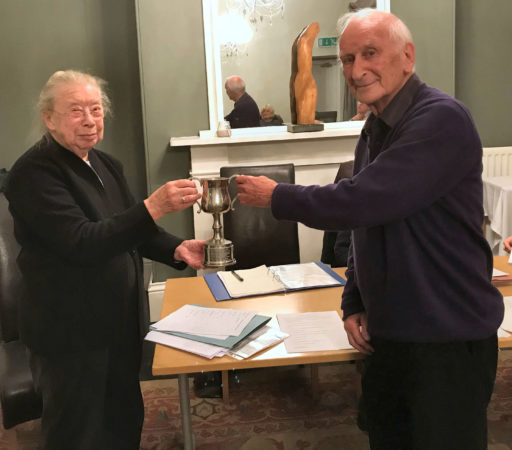
Our adjudicator, Anne Carrick, began by saying that she had enjoyed all the pieces and that one had even taken her back to her misspent youth in Northumberland. She went on to suggest that her credentials to act as an adjudicator rested on her experience as a critical reader. What she was looking for was something that had a striking beginning and an ending that rounded things off. She reminded us that every word must count and that proofreading before submission was essential. The need to consider the target audience, be it academics, newspaper readers or whatever, was also important.
Anne concluded her introductory remarks by saying that she had found a strong streak of feminism in many of the stories. She then went on to give her thoughts on each of the ten entries. Finally she announced the winners in reverse order as follows:
• 3rd place – ‘A Show of Hands’ – Sheila Whitfield
• 2nd place – ‘Dancing Feet’ – Maggie Cobbett
• 1st place – ‘A Picture Telling Many Stories’ – Phil Cook
Anne presented the trophy and this was followed by Phil reading his winning entry. It concerned the pleasure he had got from a print, bought for £5 at a boot sale, showing a Vienna streetscape painted by Herta Czoernig (1886-1970) above a few bars of Beethoven’s Appassionata Piano Sonata.
Maggie then read ‘Dancing Feet’, which explained how one look at a professional ballerina’s feet, scarred by her years en pointe, had killed any childhood notion of following suit. She had gone on to explore other dance genres, though, finishing with a love of salsa.
Sheila, inspired by the Group’s 2019 outing to Littlethorpe Potteries, had begun with the importance of hands to the work of the potter and continued into a reflection on the complexity and dexterity of hands in general and their place in both art and culture. She then read Malcolm Glasby’s entry, ‘A Personal Collection’, which described some of the artists from whom he had purchased original work and also the role of his wife Margaret’s own work in their art collection.
Finally Joe Peters read his entry ‘The Sound of Music’ which described how he came to be interested in and active in the world of folk dance – in particular Scottish, Irish and Dutch – and song, meeting Daphne at Scottish Country Dancing when living in The Hague. Today he finds watching Morris Dance very moving while he and Daphne have a large collection of traditional and folk dance music.
Malcolm and Phil are both retiring from the Group and Maggie paid tribute to the great contribution that both have made over the many years of their membership.
Finally, Maggie thanked Anne Carrick for her very positive and thorough adjudication and presented her with a token of the Group’s appreciation.
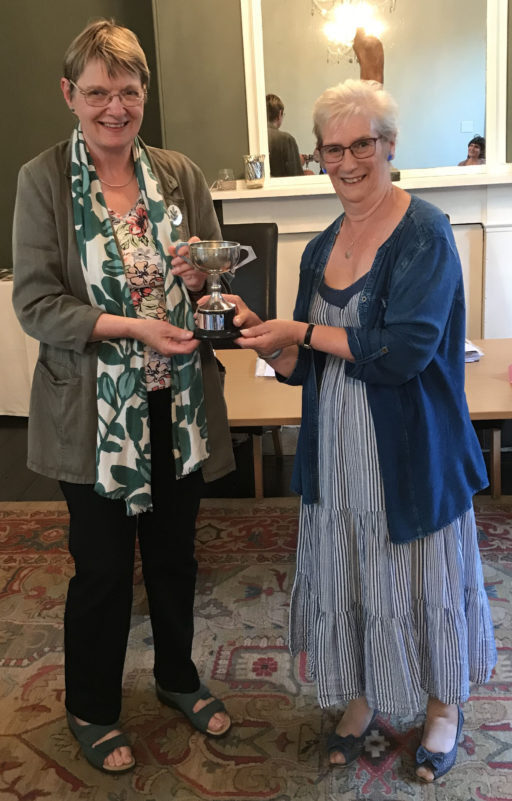
Anne Powell began her adjudication by giving some background to the trophy presented to the Group by her mother. She went on to say that she had enjoyed the eleven entries, which had covered such a wide range of topics – including eco issues, murder and geriatric drug dealing – that it had been difficult to make a judgement.
After presenting her comments on the individual entries Anne announced the results as follows:
• Winner – Susan Perkins with ‘Brief Notes on the First Week of a Very Big Undertaking’
• Runner-up – Christine Summers with ‘Parenthood’
Anne presented Susan with the trophy. The entries were then read in the following order:
• Susan – ‘Brief Notes on the First Week of a Very Big Undertaking’ – a retelling of the Genesis Creation story
• Christine – ‘Parenthood’ – a young woman mourns the loss of a baby whose heart had stopped beating several days earlier
• Caroline – ‘Stop the World I Want to Get Off’ – a man sitting by a canal gets a disapproving look from a passing jogger
• Phil – ‘When is a Good Turn not a Good Turn’ – a spider rescued from a house is eaten by a bird
• Peter H (Read by Sheila in Peter’s absence) – ‘It’s Time to Tell her’ – a man wants to tell a woman that he loves her but when he spots her she is with someone else
• Sheila – ‘You Couldn’t Write it . . . . ‘ – an Oregon novelist who has written on the subject of husband murder eventually becomes the suspect when her own husband is murdered
• Peter P – ‘What the Picture Suggested’ – a story of possible murder inspired by a painting of an empty potting shed seen in a local art exhibition
• Maggie – ‘Vaudeville Stars’ – piano playing Siamese twins discuss a former lover
• Carol – ‘These Days’ – the frustrations of growing old
• Janet – ‘The End of the Line’ – a bee killed in a kitchen fails to fertilise the flowers in a nearby orchard
• Joe – ‘Self-help at St Peters’ – a very elderly stalwart of a local church is discovered to have been involved in growing cannabis
After all eleven entries had been read Sheila invited Anne to share a piece of her own writing. She obliged with the short story ‘Ripples’, inspired by childhood memories of her grandparents’ house in Denby Dale.
Sheila then thanked Anne for her adjudication and presented her with a token of the Group’s appreciation. Members present reinforced the thanks in the usual manner and Anne took her leave as she had a 1½ hour journey to return home.
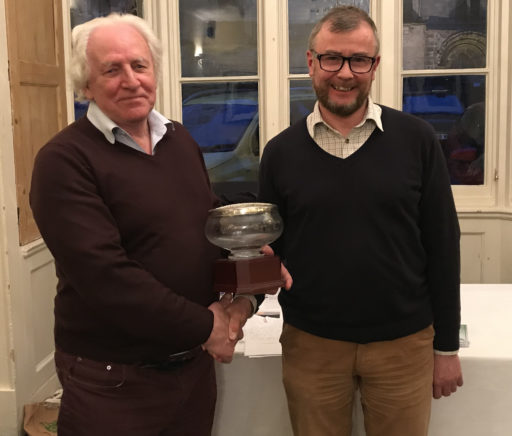
Sheila introduced Graham Chalmers, a journalist working for JPI Media as Features Editor for the group of newspapers that includes the Ripon Gazette. She recalled that this was not the first time he had adjudicated for our Group.
Graham began by insisting that he was a journalist rather than a writer. He had come to the profession after reading politics and modern history at university. In his view one didn’t have to be a good writer to be a journalist. He then went on to talk about the process of writing, describing for example how he had developed his own style for music reviews after researching the styles already found in print.
Turning to the competition entries, Graham said that it had been hard to choose the top three – all ten entries were well-written and intelligent. He then proceeded to give his comments on the individual entries. Having done so he announced the winners as follows:
• 3rd – Peter Hicks with 11 Dawson Street
• 2nd – Claire Cox with Home is where You Hang your Hat
• 1st – Malcolm Glasby with No 5 – a House and Home Remembered
Graham then presented the trophy to Malcolm.
Graham had to leave immediately after the break to meet a deadline for his weekly column, but not before Sheila expressed the Group’s thanks and presented him with the usual token of appreciation.
Sheila then read Malcolm’s prizewinning entry, which took the form of a memoir of his childhood home and brought the story on to the present day. Claire then read her second place entry, an account of various houses in England and abroad where she had made her home. In the absence of Peter H, the final reader of the day was Phil with his competition entry What Makes a House a Home? – a reflection on that subject using examples from various stately homes he and his wife had visited.
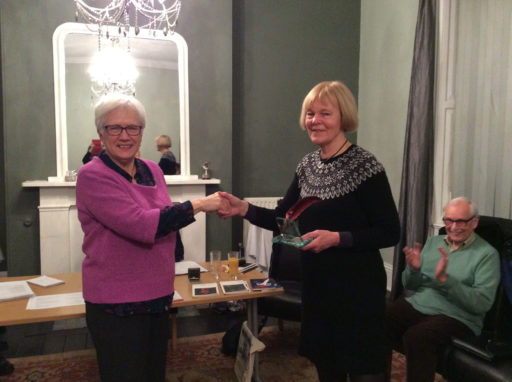
Sheila introduced Carole Bromley from York, adjudicator of the 2018 Poetry Competition. Carole is a published poet who has won several competitions and been placed in more. An English teacher by background she has also been a Creative Writing tutor at York University’s centre for Lifelong Learning.
Carole began her adjudication by confirming and updating the information that Sheila had given about her in introducing her. She said that she had begun writing poetry while taking students to the Arvon Centre at Lumb Bank. Turning to the adjudication itself she said that her judgement was inevitably subjective and influenced by her personal taste. Although all the entries were of a good standard she had recognised the winner on sight. Whilst being flexible rather than judging by a hard set of rules she was looking for:
• Confidence of tone
• Skilful handling of form
• An awareness of contemporary poetry
• Appropriate use of language and spoken rhythms
• Effective imagery
• Interesting subject matter
• A good title
• A cracking ending
• A clear message economically put
• An absence of clichés, archaisms and word order twisted to suit the rhyming scheme.
She pointed out that modern poets tended not to follow the old convention of beginning each line with a capital letter.
After the general introduction Carole gave her individual comments on each of the entries before announcing the results. These were:
• Commended – ‘Through an Upstairs Window’ by Lindsay Trenholme and ‘The Shift of Time’ by Kate Swann
• Joint third place – ‘Not a Hope’ by Maggie Cobbett and ‘La Manche’ by Daphne Peters
• Second place – ‘The view from the Mat’ by Janet Barclay
• First Place – ‘Safe Keeping’ by Sheila Whitfield
There was time before the refreshment break for all the above six poems to be read, Sheila reading ‘The Shift of Time’ in Kate’s absence. As with most of the readings during the evening the authors present spoke briefly about the inspiration behind their poem.
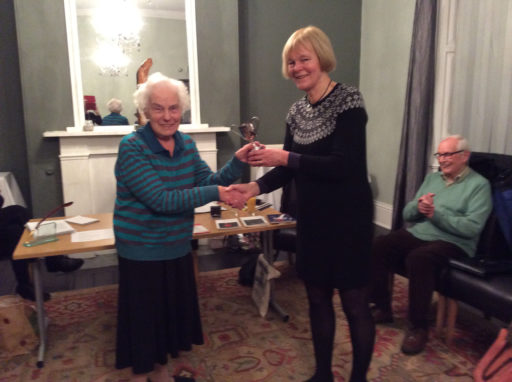
After the break Carole presented the Poetry Competition trophy to Sheila and The President’s Cup for 2018 to Janet who had been absent when the result of the latter competition had been announced at the Christmas Event.
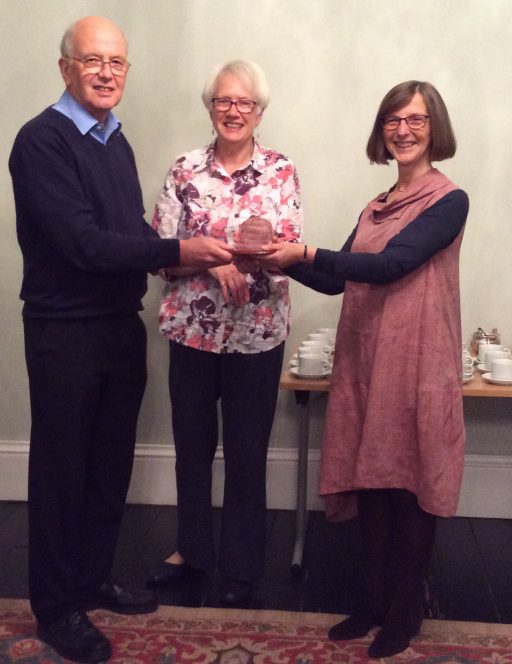
At Sheila’s invitation, Susan introduced Delphine Ruston, a former English teaching colleague of hers. Delphine’s background includes an interest in photography, a therapeutic counselling qualification and the experience of taking groups to the Arvon Centre at Lumb Bank. Susan felt she was suitable for the adjudicator role because she is interested in words, people and ‘how things seem’.
Delphine began her adjudication by saying that the invitation had come within a few days of her recent retirement. It had proved to be an enjoyable task. Her own writing is focused at present on writing a memoir of her grandmother which she wants to publish as a handmade book. (This has now aroused her interest in bookbinding.) After that she wants to write creatively. In the course of her comments she referred to and read from Philip Pullman’s book ‘Daemon Voices’.
Turning to the competition entries Delphine said that they were very different but all enjoyable. She said that in judging them she had been looking for
• The quality of the idea – was it imaginative? Did it pique interest?
• A short story that lingered – did it have a poetic quality?
• Coherence and craft skills such as leanness and economy in the use of words?
• A voice that was credible and sustained
• A first sentence that plunged straight in the action
• The impact of the ending – was it perhaps satisfying or unnerving?
She went on to suggest some challenges in short story writing, including the following points
• Don’t make the meaning explicit – the story should relate events not interpret them
• ‘Less is more’
• In choosing the subject matter, don’t be frightened of the inconsequential. The subject matter does not have to be weighty.
Delphine then turned to her comments on the individual stories and her reaction to them. Having completed those comments she was invited to announce the result as follows:
• Second – Maggie with ‘Daddy Haircare’
• Joint First – Peter P with ‘“Venus Must Have Heard My Plea”’ and Sheila with ‘Beginnings and Endings’
Peter and Sheila shared the trophy.
After the break the three winning stories were read.
‘“Venus Must Have Heard My Plea”’ is a tale of the semi-retired Roman Gods and Goddesses taking over the Big House in a twenty-first century Yorkshire village as a retirement home and getting involved in the lives of the locals. The title is a quotation from a Sandy Shaw hit song.
‘Beginnings and Endings’ is the story of a woman out walking her dog who discovers a corpse on a railway cutting side. It is written in an experimental format with four segments which can be read in any order.
‘Daddy Haircare’ is a daughter’s tale of bonding with her widower father as he deals with her hair.
When these three stories had been read Sheila and Susan thanked Delphine for her adjudication and presented her with the usual token of the Group’s appreciation.
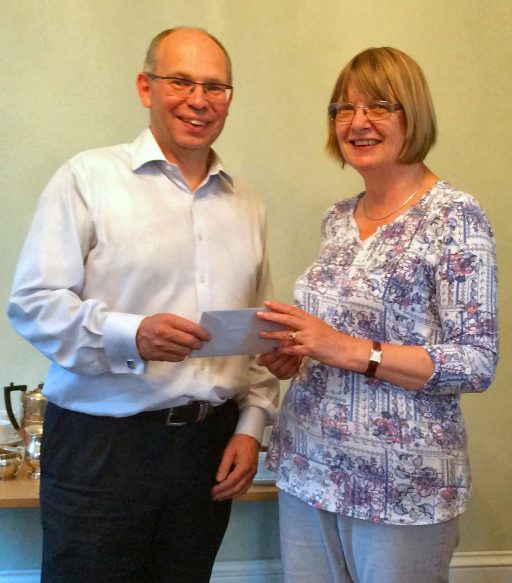
Our adjudicator on this occasion was Chris Lloyd, Chief Feature Writer for ‘The Northern Echo’ and the ‘Darlington and Stockton Times’. Well used to reading and ‘marking’ other people’s writing, he stressed the importance of grammar, spelling, structure and style.
After giving a very detailed critique of each of the entries in turn, Chris announced the results as follows:
• 3rd – Malcolm Glasby with ‘Some Enchanted Evening’ – a family memoir, the title coming from the tune which played a part in the story
• 2nd – Peter Page with ‘History as Teacher’ – a look at how and why we should learn from history
• 1st – Janet Barclay with ‘The Rise and Fall of the West Gallery’ – an account of the galleries provided in churches for musicians accompanying services.
As Janet was not present, the second and third placed entries were read out before Chris was thanked by Susan (Competition Secretary) and given a token of our appreciation.
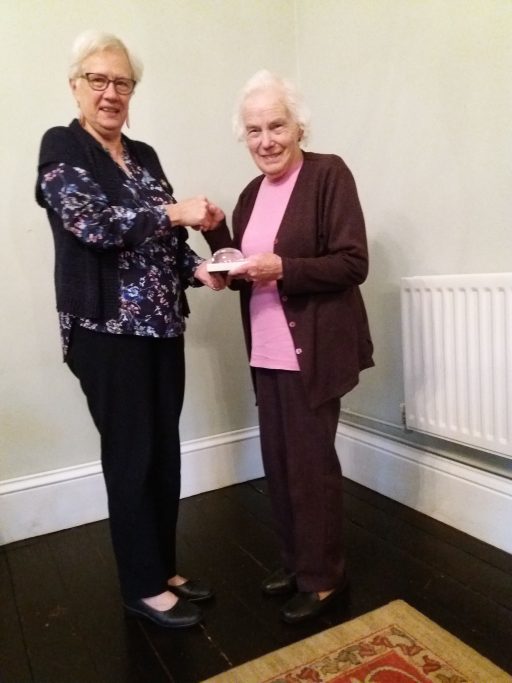
The photo above shows Janet being presented with the Mary Rawnsley trophy at the first possible opportunity after the adjudication.
« Newer Entries | Older Entries »










